#anyway. hes blorbo from my german classics
Explore tagged Tumblr posts
Text
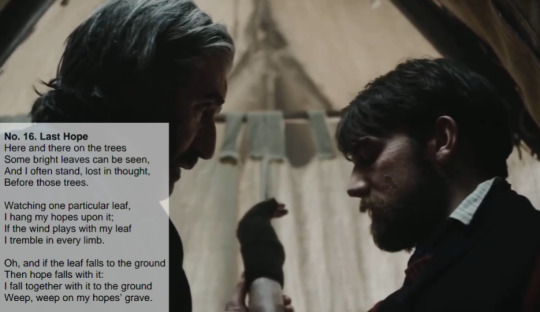
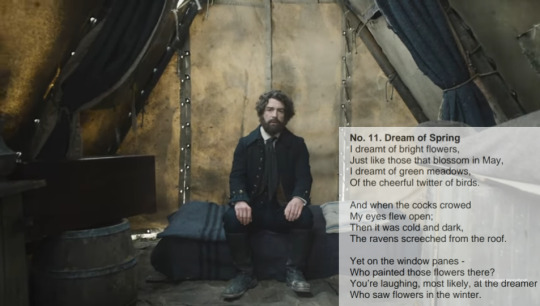
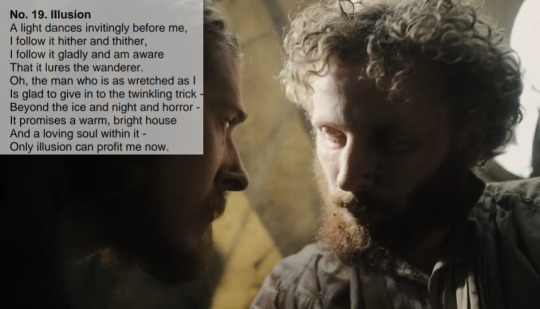
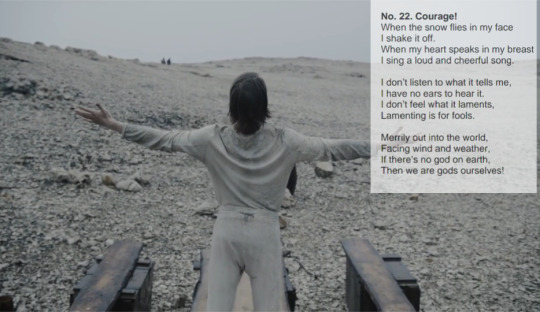
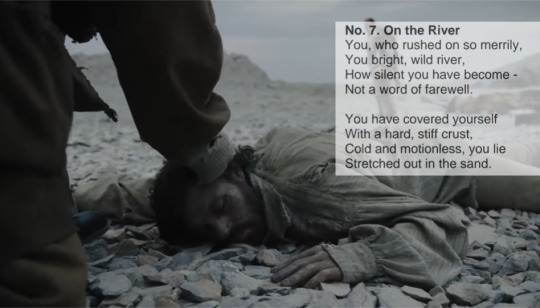

"I came here as a stranger, as a stranger I leave again."
The Terror (2018) + Winterreise (Franz Schubert, text by Wilhelm Müller)
English Translations by Michèle Lester
Context & thoughts below the cut:
I think Winterreise works really well alongside The Terror. Beyond the base similarity of "going on a long doomed journey through the cold" I just think the vibes match up really well. I first made the connection when I was listening to No. 23, where the singer witnesses a morning sun dog and compares the two false suns to the eyes of the woman he'll never see again:
Winterreise (or The Winter Journey) is a song cycle for tenor and piano written by Franz Schubert in 1828, set to the work of German poet Wilhelm Müller. It's loosely narrative in nature, and follows a man who is cast out from his village after the death of his lover. He embarks on a meandering, directionless journey through the frozen wilderness, commenting on the things he sees and feels. The end of the song cycle is vague, and the wanderer's fate is left uncertain.
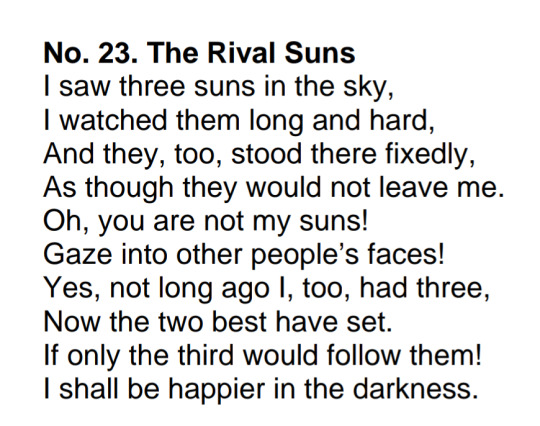
I didn't include this one in the main post because I think the connection between the poem and Crozier is just one step too far removed for it to make sense in a post without context, but I wanted to mention it here somewhere because it really just feels like a perfect match.
Looking past just the text, the music of Winterreise is some of my favourite ever written for the human voice. It's bleak, it's haunting, it's Schubert at his best. There's this pervading sense of hopelessness through the entire work - sometimes raging and desperate, sometimes cold and listless, sometimes interrupted by moments of joy and light before falling again into desolation. Rarely has a piece of music left me feeling so hollow inside. The Terror left me feeling the same way.
If you're at all interested in classical music, I cannot recommend enough that you give this a listen. I'd recommend the Peter Pears recording, or the Dietrich Fischer-Dieskau recording if you don't vibe with Pears' voice (I wouldn't blame you, he's got this sort of ghostly wail-like quality to his sound that can be very jarring.) There's also a 1968 video of Pears and his partner (composer and pianist Benjamin Britten) performing and discussing the music, which is absolutely worth a watch if you want to see two old gay men talk about music for 10 minutes.
Anyways, this is all to say that being into classical music does not free you from Blorbo Song Disease. If anything it just makes it more embarrassing. I can't just make a character playlist and call it a day, I have to make pretentious and long-winded Tumblr posts that would make my Song Interpretation professor claw her hair out.
#the terror#the terror amc#john bridgens#henry peglar#bridglar#henry goodsir#hickeygibson#billy gibson#cornelius hickey#thomas jopson#francis crozier#i can't stop thinking about “you're laughing; no doubt; at the dreamer/who saw flowers in winter”#and Goodsir's death hallucinations#and “this place is beautiful to me even now. to see it with eyes as a child's - there is wonder here.”#thinking about Hickey and “if there's no god on earth/then we are gods ourselves!” and refusing to listen to the lamentations of his heart#thinking about Billy who has known for awhile what Hickey might be but is drawn to his warmth and brightness despite it all#thinking about Crozier whose first concern was always for his men. And who didn't allow himself to stop & grieve until the last one had die
67 notes
·
View notes
Note
I'm back with another aria! (Sorry, I think my opera singer is peeking through... actually no, I'm not sorry about that at all). You gave me permission to come at you with classical music, so here we are >:)
This one needs a translation, so this ask going to be rather long. Also, I feel like I should provide context, because it's too funny if you think about it long enough/too long.
So, the aria is Agathe's scene/aria "Wie nahte mir der Schlummer ... Leise, leise" from Der Freischütz by Carl Maria von Weber. It’s in German, so here is my best attempt at a translation of the weird ass grammar in this aria (I'll add a short summary of the opera afterwards, there definitely is a 1941 thing going on here):
How did slumber approach me before I saw him.
Yes, love tends to go hand in hand with grief. Does the moon laugh (as in shine) over his path? What a beautiful night!
Softly, softly, my devout tune, fly up towards the circle of stars. Song, resound, celebrating my prayer may waft to the heavenly hall.
Oh, how bright the golden stars! With what pure light they glow! Only there, by the distant mountains, a storm seems to be brewing. There, by the forest, a host of dark clouds is floating, dull and heavy.
To you I turn my hands, Lord without beginning and without end. To protect us from dangers, send your angelic hosts!
Everything is at rest. Beloved friend, why do you delay? Even if my ear eagerly listens, only the pine is rustling. Only the birch's leaves in the grove whisper through the serene silence. Only nightingale and cricket seem to enjoy the night air.
But how? Is my ear not deceiving me? There, it sounds like footsteps, there from amidst the pines, something emerges - It's him! The flag of love may stream! Your girl is awake even in the night!
He doesn't seem to see me yet.
God, if the moonlight doesn't deceive me, flowers adorn his hat! Certainly! He did the best shot! That means good fortune for tomorrow!
Oh, sweet hope! Newly revived courage!
All my pulses beat, and the heart is beating brashly, sweetly delighted towards him!
Is it not deceit? Is it not delusion? Heaven, accept the tears of gratefulness for this favour of hope!
And here is the promised summary:
Agathe is the forester's daughter. She and Max are engaged, but he is only allowed to marry her if he wins a shooting contest to prove that he is capable of taking over her father's business. He's a good marksman, but lately, he's been too nervous to land his shots (yes, this opera can be read as a metaphor for erectile dysfunction. No, I did not make that up). So, he strikes a deal with a demon, Samael: he gets seven bullets that will always find their target.
The catch Samael doesn't tell him about: the first six will hit whatever Max wants them to. The seventh one though will hit what Samael chooses.
The next day, the day of the contest, arrives, and Max wins. With only one bullet left, he wants to shoot a dove in celebration. However, Samael chooses Agathe as his target. But, by the power of being a Good Girl (tm), she miraculously escapes (no, I did not make that up, either. She's literally too good and too pious to be hit by the devil's bullet. Also she got a blessing from a hermit).
In the end, the hermit appears and tells her dad to stop it with the contests, poor boy was so under pressure he literally couldn't shoot without help from the devil. And it was a dumb tradition, anyway.
Max and Agathe are allowed to marry, everyone's happy, the end.
The aria is set while Max is in the woods making his deal with Samael. Agathe sits at home, waiting for him, because he said he'd go practice and then come back and visit her.
Have fun with this one!
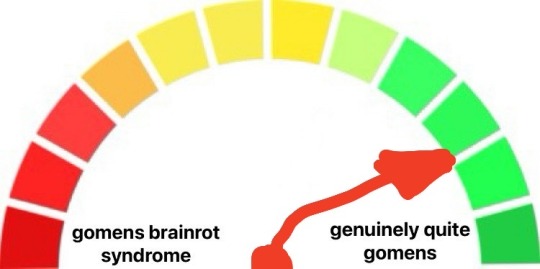
Don’t know about that summary and it is literally about other blorbos BUT lyrics wise this serves up all the good gomens flavour like heaven lord even a nightingale, the pining’s real good, i suppose the bullet thing is 1941-ish, excellent submission overall!
5 notes
·
View notes